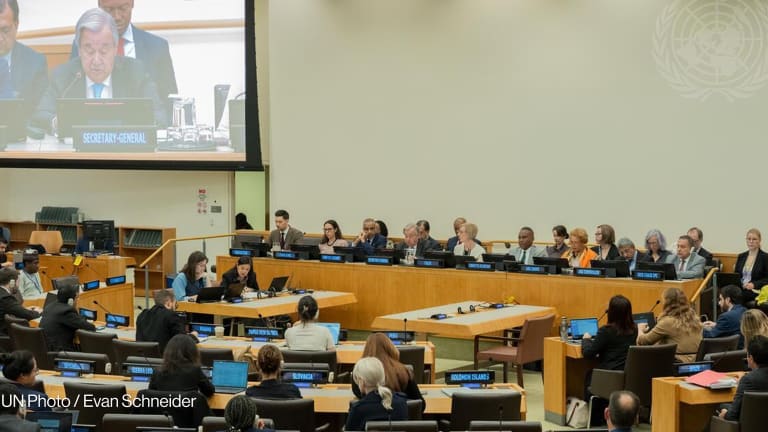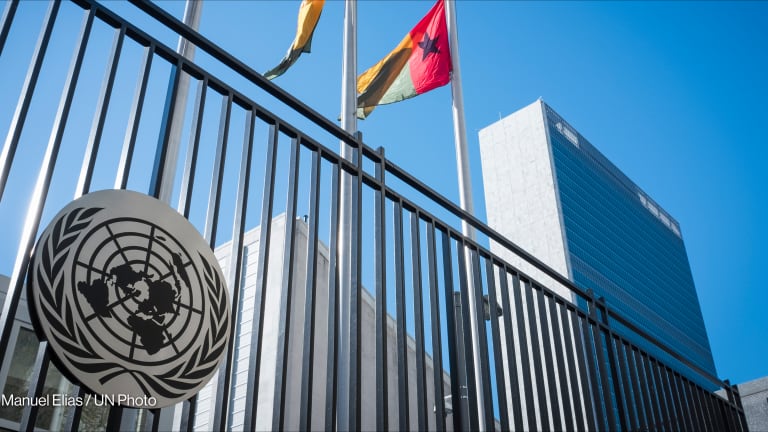EU aid to Palestinian territories: Waves of change?
The European Union has long been one of the largest and most reliable donors to the Palestinian territories, but its aid practices and policies have increasingly come under fire. Devex takes a closer look into the bloc's aid model and where it is headed.
In the wake of a recent 50-day war between Israel and Hamas, officials from across the globe gathered Oct. 12 in Cairo to attend an international donor conference for the reconstruction of Gaza. Exceeding grim expectations of donor fatigue, global pledges to rebuild the war-ravaged enclave amounted to $5.4 billion. However, an acute sense of déjà vu lingers over the international community, which is slowly coming to the sobering realization that two decades of ever-increasing aid have outright failed to lift the fortunes of Palestinian populations. The European Union has long been one of the largest and most reliable development aid donors to the Palestinian territories, handing out an annual average of 480 million euros ($606 million) since 2007. But amid the recent collapse of U.S.-mediated peace talks and accelerated Israeli settlement-building, the assumption that aid can help advance a two-state solution is being questioned as never before — prompting fundamental questions about whether EU financial assistance to Palestine is headed in the right direction. An approach under fire The stated overarching goal of EU support for the Palestinian territories is to lay the foundations of a future Palestinian state, living side by side in peace with Israel. Over the years, the EU has played a key role in relieving the hardships of Palestinian populations and establishing Palestinian governmental bodies. However, it has largely been ineffective in preparing the field for sustainable economic growth and viable governance — a conclusion reached by two recent assessments of EU cooperation with Palestine. In a special report issued late last year, the European Court of Auditors revealed major dysfunctions in the PEGASE mechanism, the EU’s direct financial support for the Palestinian Authority. Among other things, the Court noted that the absence of aid conditions undermined Brussels’ ability to push for institutional reforms that are crucial to ensuring accountability of the Palestinian leadership to the populations it represents. More recently, an evaluation by the European Commission of its support for the Palestinian people between 2008 and 2013 found that that the design of EU aid policy is inadequate in “removing obstacles to Palestinian statehood and development” and thus counterproductive to the EU’s political objective of a two-state solution. International observers and Palestinian advocates share comparable views. Calling for a complete overhaul of the EU’s aid approach in Palestinian territories, they argue that in its current form, European assistance thwarts the political and economic development of Palestinians — notably by subsidizing an undemocratic leadership and fuelling an artificial economy dependent on foreign funds. Further criticisms focus on the outdated premises of the EU’s cooperation framework — which have now been made even more obsolete with the establishment of a long-awaited “government of national consensus,” made up of technocrats approved by all Palestinian political groups. “EU cooperation today is largely devised from measures designed in 2007 following the Gaza takeover by Hamas. This template, though refined and carefully administered, is largely an artifact of a now bygone era,” highlighted Joseph Saba, a partner at consulting firm Strategies for Stability with 13 years of experience as Middle East director at the World Bank. As hopes for a peace agreement dwindle further, the EU is also faced with the stark realization that its aid might be propping up the status quo, relieving Israel of its obligation under international law to ensure the welfare of populations under its occupation. Looming donor fatigue With little political progress to show for, the idea of upholding high levels of assistance without end is progressively being queried by EU officials — fuelling reports that the bloc’s aid could plummet in the next three to four years. “We can’t carry on indefinitely with the money we are expending on Palestine without seeing results,” an EU official speaking on condition of anonymity told Euractiv in early September. EU reluctance to pay up is worsened by concerns that help to Palestinian territories — especially Gaza, which has suffered three conflicts in the past six years — would be lost in another cycle of violence or intentionally demolished by Israel. “The EU is actively involved in rehabilitation and reconstruction efforts in Gaza. However this should be the last time we have to face hard questions about the logic of a pattern of build-destroy-build, every few years,” warned John Gatt-Rutter, EU representative for the West Bank, Gaza and U.N. Relief and Works Agency for Palestine Refugees in the Near East. But even if European resistance to fork out funds is more palpable than ever, a substantial reduction of EU funding to Palestinian territories remains unlikely in the near future. “It is uncontroversial that the current levels of aid are unsustainable if there is no political horizon or fundamental change in the situation in the field,” said Deborah Casalin, Palestine-Israel policy officer at CIDSE. “However, at the same time, the EU also has a serious interest in maintaining stability, avoiding negative impacts on the population, and supporting the Palestinian Authority as a means to keeping the two-state paradigm afloat.” ‘Aid will never buy peace’ Diplomats and stakeholders concentrate much of their attention on levels of aid to Palestinian territories — automatically augmenting budget lines and repeating existing modalities — when emphasis should in fact be put on “smarter” aid. “The challenge is how to make better use of aid,” explained Federica Bicchi, an associate professor specializing in EU relations with Mediterranean countries and the Middle East at the London School of Economics. “The main aspect is how to avoid ‘doping’ the Palestinian context with financial provisions for which nobody is accountable.” Fundamentally, only strong political will can lead to a change in aid impact. But the EU’s current aid approach is essentially flawed that it has become a fig leaf for the absence of a viable political track. As pointed out by Alaa Tartir, program director at Al-Shabaka, The Palestinian Policy Network, the EU — and the international donor community at large — must start realizing that “aid will never buy peace.” “The main aspect is how to avoid ‘doping’ the Palestinian context with financial provisions for which nobody is accountable.” --— Federica Bicchi, associate professor specializing in EU relations with Mediterranean countries and the Middle East at the London School of Economics Many EU declarations at the highest level have condemned prolonged occupation, settlements and Palestinian fragmentation — for instance by holding Israel accountable for violations of humanitarian law or discouraging business with settlements. But such zealous statements have yet to be underpinned by decisive political action. “The issue of political will concerns the authorization of incentives or sanctions to cease, remedy or mitigate the negative effects of actions which the EU declares to be illegal or contrary to its principles of good governance,” Middle East expert Saba told Devex. “[But] repeated EU political declarations on these matters have not been matched in the cooperation by specific measures which substantially improve prospects for a two-state solution.” Despite all the huffing and puffing, Israel continues to enjoy many privileges in its partnership with Brussels — including preferential trade agreements and a fruitful scientific cooperation. This has led many to denounce the “compartmentalized” relationship the EU and Israel sustain, in which economic tools are not leveraged to achieve political goals. The realistic way forward Looking ahead, aid practitioners and academics have formulated many recommendations for the EU to finally put Palestinian territories on the path of development and statehood. Yet a major overhaul of the EU’s cooperation framework seems unlikely under current circumstances, as irreconcilable differences in opinions regarding Palestine and Israel continue to persist among the bloc’s 28 member states. “To restructure its aid dollars … the EU would have to act with unanimity that may be impossible given a [Conservative-led] U.K. government and Germany's past history,” argued Jeremy Wildeman, a Ph.D. candidate at Exeter University focusing on the role of foreign aid to Palestinians. However, internal disagreements don’t eclipse all possibilities for the EU to ensure better efficiency and accountability of its assistance to Palestinians — and ultimately, achieve concrete strides toward a two-state solution. A good starting point would be for Brussels to systematically demand for compensation from Israel when EU-funded infrastructure is demolished, damaged or dismantled by Israeli forces. Discussions for a unified European position on the issue are still underway, but the situation is urgent. “So far this year the Israeli authorities have demolished more than 80 structures funded by international aid, and many more are at risk of demolition. Seeking compensation and assurances will help ensure accountability of EU aid and help protect Palestinian civilians,” stressed Natalia Alonso, deputy director of advocacy and campaigns at Oxfam. Ensuring more aid impact and sustainability in the context of current constraints can also be achieved with existing projects and programs, notably through more robust monitoring and evaluation. “Monitoring and evaluation are measures that can establish a better, more informed empirical basis for more effective aid. There is ample political will for better results in monitoring and evaluation, especially in health and education,” underlined Saba. Finally, the EU should take time to elaborate a results-based approach linking disbursements to the attainment of certain conditions and objectives. The recent adoption of a Single Support Framework, which provides a strategic set of indicators for EU cooperation with Palestine, is a step in the right direction. Check out more insights and analysis provided to hundreds of Executive Members worldwide, and subscribe to the Development Insider to receive the latest news, trends and policies that influence your organization.
In the wake of a recent 50-day war between Israel and Hamas, officials from across the globe gathered Oct. 12 in Cairo to attend an international donor conference for the reconstruction of Gaza.
Exceeding grim expectations of donor fatigue, global pledges to rebuild the war-ravaged enclave amounted to $5.4 billion. However, an acute sense of déjà vu lingers over the international community, which is slowly coming to the sobering realization that two decades of ever-increasing aid have outright failed to lift the fortunes of Palestinian populations.
The European Union has long been one of the largest and most reliable development aid donors to the Palestinian territories, handing out an annual average of 480 million euros ($606 million) since 2007. But amid the recent collapse of U.S.-mediated peace talks and accelerated Israeli settlement-building, the assumption that aid can help advance a two-state solution is being questioned as never before — prompting fundamental questions about whether EU financial assistance to Palestine is headed in the right direction.
This story is forDevex Promembers
Unlock this story now with a 15-day free trial of Devex Pro.
With a Devex Pro subscription you'll get access to deeper analysis and exclusive insights from our reporters and analysts.
Start my free trialRequest a group subscription Printing articles to share with others is a breach of our terms and conditions and copyright policy. Please use the sharing options on the left side of the article. Devex Pro members may share up to 10 articles per month using the Pro share tool ( ).
Manola De Vos is an Engagement Lead for Devex’s Analytics team in Manila. She leads and designs customized research and analysis for some of the world’s most well-respected organizations, providing the solutions and data they need to grow their partner base, work more efficiently, and drive lasting results. Prior to joining Devex, Manola worked in conflict analysis and political affairs for the United Nations, International Crisis Group and the EU.








